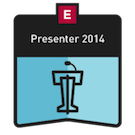"People expect to be able to work, learn, and study whenever and wherever they want to. Life in an increasingly busy world where learners must balance demands from home, work, school, and family poses a host of logistical challenges with which today’s ever more mobile students must cope. Work and learning are often two sides of the same coin, and people want easy and timely access not only to the information on the network, but also to tools, resources, and up-to-the moment analysis and commentary. These needs, as well as the increasingly essential access to social media and networks, have risen to the level of expectations. The opportunities for informal learning in the modern world are abundant and diverse, and greatly expand on earlier notions like “just-in-time” or “found” learning."
View the 3min NMC Horizon Report 2012 introductory video on YouTube
MOOCs and the Future of Higher Education
Been following MOOCs since the early days when they were more about people and connectivism and less about companies and systems. This past year I took (and completed!) my first MOOC. I posted about my MOOC experience and showed off my "Statement of Accomplishment" on Google+. I also created a public Google doc with a few links to information on MOOCs to easily share with others who inquire.
If you're interested in this topic, (and if you work in higher ed, I hope you are at least following the developments), or curious to see what a "Statement of Accomplishment" from a Stanford prof looks like, here's my doc on MOOCs and Higher Education
Watch this TED Talk - Daphne Koller: What we're learning from online education
Mobile Everything
The computer in our pocket. According to the 2012 Horizon Report for Higher Education linked above, Mobile and Tablets (for the first time two separate categories) were both listed in the top category (rated as most significant): Time-to-Adoption Horizon: One Year or Less
Mobile
"Mobile apps are the fastest growing dimension of the mobile space in higher education right now, with impacts on virtually every aspect of informal life, and increasingly, every discipline in the university."
Mobile - Relevance for Teaching, Learning, or Creative Inquiry
"Mobile apps embody the convergence of several technologies that lend themselves to educational use,including annotation tools, applications for creation and composition, and social networking tools. GPS and compasses allow sophisticated location and positioning, accelerometers and motion sensors enable the apps to be designed and used in completely new ways, digital capture and editing bring rich tools for video, audio, and imaging. Mobile apps encompass it all, and innovation in mobile device development continues at an unprecedented pace."
Tablets - "Relevance for Teaching, Learning, or Creative Inquiry
"Because of their portability, large display, and touchscreen, tablets are ideal devices for one-to-one learning, as well as fieldwork. Many institutions are beginning to rely on them in place of cumbersome
laboratory equipment, video equipment, and various other expensive tools that are not nearly as portable or as inexpensive to replace."
Recently Pew Internet released its first Mobile Connections to Libraries report (especially helpful as a reference point in years to come). More importantly for academic libraries and higher ed in general are findings from the 2012 ECAR Study of Undergraduate Students and Information Technology.
A statistic I see as especially important:
"A greater percentage of students in 2012 (62%) than in 2011 (55%) said they own a smartphone, and nearly twice as many in 2012 (67%) than in 2011 (37%) reported using their smartphone for academic purposes."
Academic Libraries
This past week myself and three other librarians visited with a library director who used to live and work in the Portland area and was back visiting during the holidays from out of state. Naturally, we discussed the future of academic libraries which to all of us boiled down to the future of higher education.
Google+ and especially Hangouts
Google+ really fits in the social media category below but I'm giving it its own spot as I believe it's about more than just another social network. I see it as all things Google integrated into all things online (especially if you use gmail and are logged into your account).
WSJ Update (Jan 2, 2013): Google executives say more integration is coming. "Google+ is Google," says Vice President Bradley Horowitz. "The entry points to Google+ are many, and the integrations are more every day."
Social Media - Twitter, Pinterest, YouTube, LinkedIn, Facebook Pages, Google+, etc.
I teach a course as an adjunct for my College of Education titled "Developing a Professional Online Identity." The course, designed for graduate Counseling Program students (soon-to-be therapists), started again in mid January. Each week I either cover a social network or focus on the broader topics such as ethics, methods and strategies involved with creating a professional identity online.
I learned a lot teaching this course last year and I'm hopeful this year will be at least as successful. The 15-week two credit hour course (change from 1 credit last year) will cover everything from LinkedIn to Google+ and the increasing importance of having an online social media policy for professionals taking the course. The Harvard Business Review Blog has a new related post: The Future of You
Other ongoing topics of interest...
Augmented Reality
Internet of Things
Surprised more hasn't developed along these lines. Blew my mind the first time I tried the experiment: HTML 5 Arcade Fire, Wilderness Downtown
Oh, and this is just flat out amazing, spend some time on this site if you get a chance: Snow Fall
There's more but I'm out of time :)


